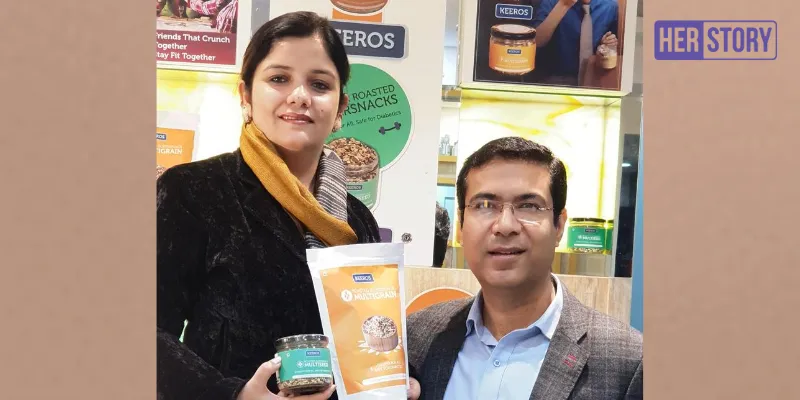This Lucknow-based healthy snacks startup is on track to clock turnover of Rs 200 cr in the next four years
Simran and Sachin Sahni took the entrepreneurship plunge in 1999. Today, their healthy snacking brand Keeros Foods has sold more than 1.5 lakh pieces of packaged snacks, priced between Rs 50 and Rs 500.
In 1999, Simran and Sachin Sahni were newly married and looking to start a business in Lucknow. The couple leveraged Simran’s expertise as a nutritionist and Sachin’s skills as an MBA graduate and founded Health Zone (now rebranded as Simran Sahni’s Health Zone) that helps clients take care of diet and weight loss needs.

Simran and Sachin Sahni, Co-founders of Keeros Foods
Started with an initial investment of Rs 3 lakh, the couple’s first stint with entrepreneurship from a Tier II city became the impetus for several other ventures in the last two decades. This included a beauty salon chain - Glamour Zone, and healthy snacking startup . Meanwhile, Health Zone grew to a chain of seven centres and incorporated workout studios as well.
With this combination of businesses, the duo is successfully tapping the fitness industry that crossed $1.1 billion in 2017 (according to Delloite report) and snack food market that is expected to grow by 10.2 percent annually between 2020 and 2025.
The Keeros journey
The entrepreneurs say that snacking is a huge part of Indian lifestyle while there were only a few healthy snacking options available. In 2017, they developed around 14 different superfoods made from healthy materials such as oats, raisins and semolina and tested the market for these products by selling them to their clients at Health Zone.
Claiming to be a “brand of roasted super snacks that are healthy for all and safe for diabetic patients”, the duo saw scope for growth with repeat customers and launched Keeros as a brand in the following year. They got branding experts on board and saw a market opportunity, especially catering to diabetic patients.

Products of Keeros Foods
Targeting the upper middle-class population, it currently offers super snacks and super drinks items priced between Rs 50 and Rs 500. Having sold more than 1.5 lakh units of snacks so far, the founders are planning to introduce ready-to-cook foods as well.
One of its best-selling products is Quinoa Grain gluten-free snack and other products with in-house recipes makes them stand apart from the competitors. In fact, the founders claim that a 100-year-old Indian FMCG brand has tried to replicate its product quality through its vendors and suppliers.
With a manufacturing unit based in Lucknow,Keeros’ products are being distributed at more than 300 retail stores in India and are available at over 10 ecommerce platforms including Amazon and Flipkart. Keeros’ products are also present in corporate offices like Google, LinkedIn, and American Express in Bengaluru, Delhi, and Mumbai. Corporate organisations also buy their products for gifting purposes.
Despite the nationwide lockdown in March following the spread of the coronavirus, the startup has registered 50 percent sales month-on-month. It saw one of its best sales during the Rakhi during the beginning of August.
Over the years, the duo has invested Rs 4 million at different intervals since inception. In March 2019, they closed their first institutional funding deal of nearly $400,000 from Mumbai-based incubation platform, Venture Catalyst. The entrepreneurs are hoping to raise another round of funding soon.
Lessons and challenges
Sachin shares that being based out of Tier II city like Lucknow has its pros and cons.
“There is no ecosystem or infrastructure for startups. Apart from a few angel investors, the city does not have any institutional venture capitalists. Thanks to technology, connectivity is not an issue and the cost of operation is much cheaper when compared to metro cities,” he says, adding that they need to travel often to close any funding deals.
Simran says she has been lucky so far and has not faced any challenges as a ‘woman’ entrepreneur. The entrepreneurs outsource any kind of production work and found the manufacturing process a challenge in the beginning. This was largely to do with procuring the right machines, setting up base in Lucknow and insist the learning curve has been helpful.
The founders plan to expand into this space and are ambitious about their future. They hope to clock a turnover of Rs 200 crore within the next four years.
Edited by Rekha Balakrishnan








